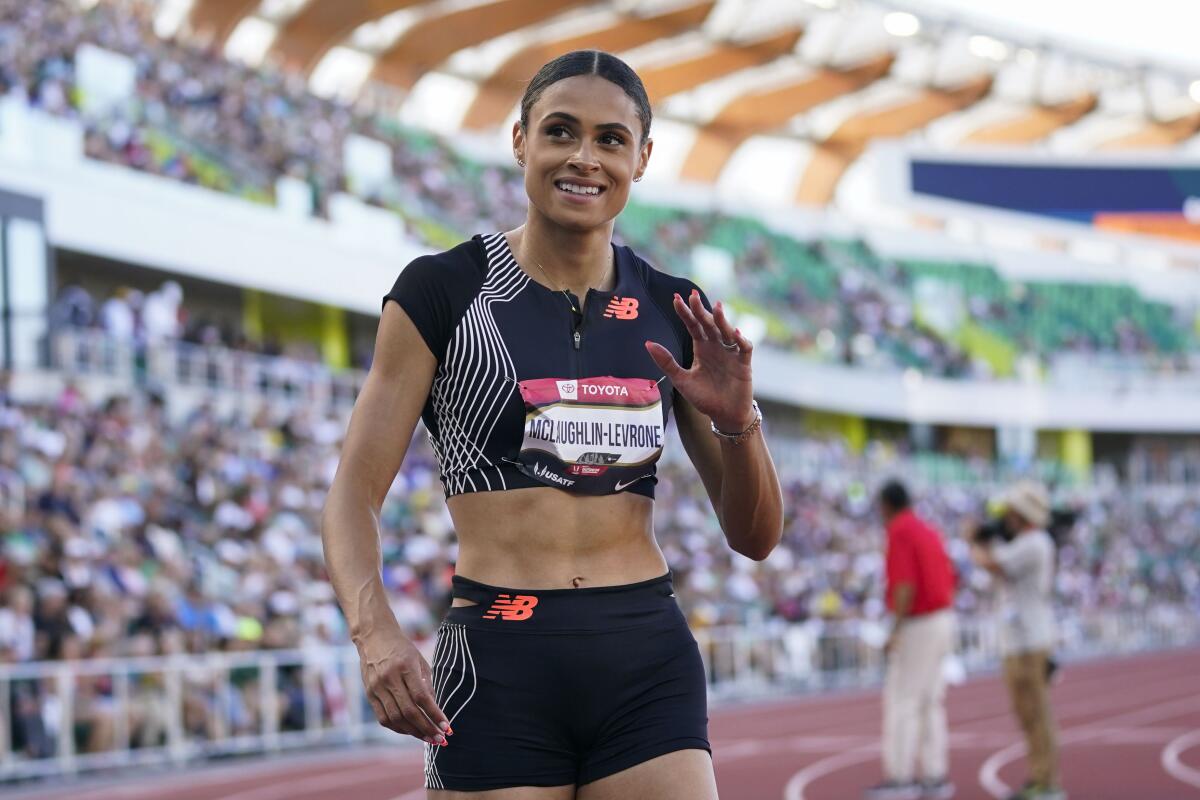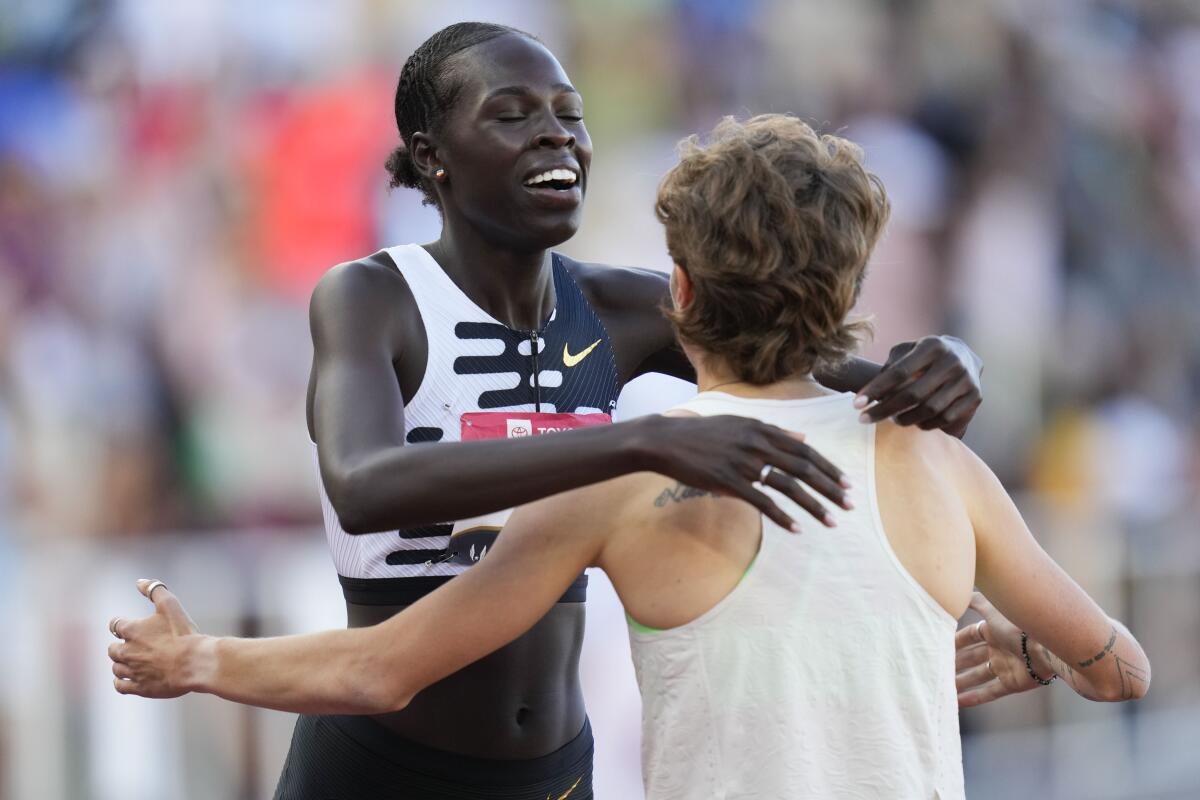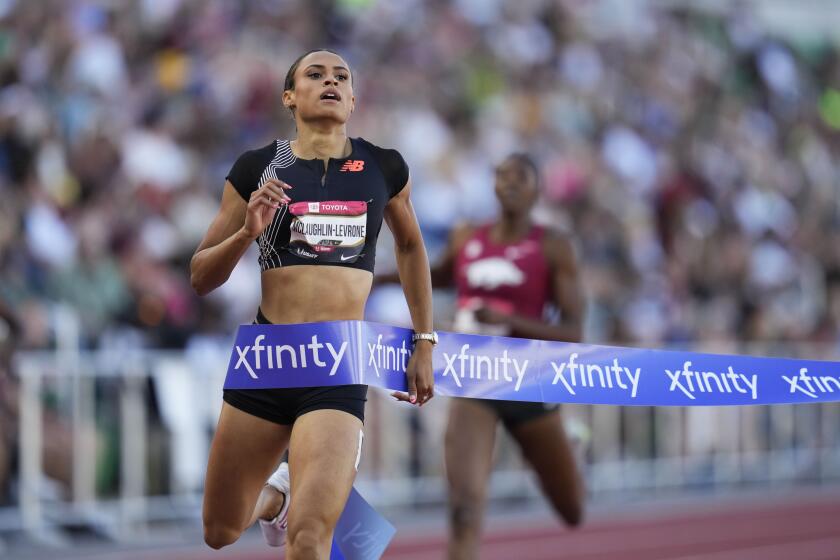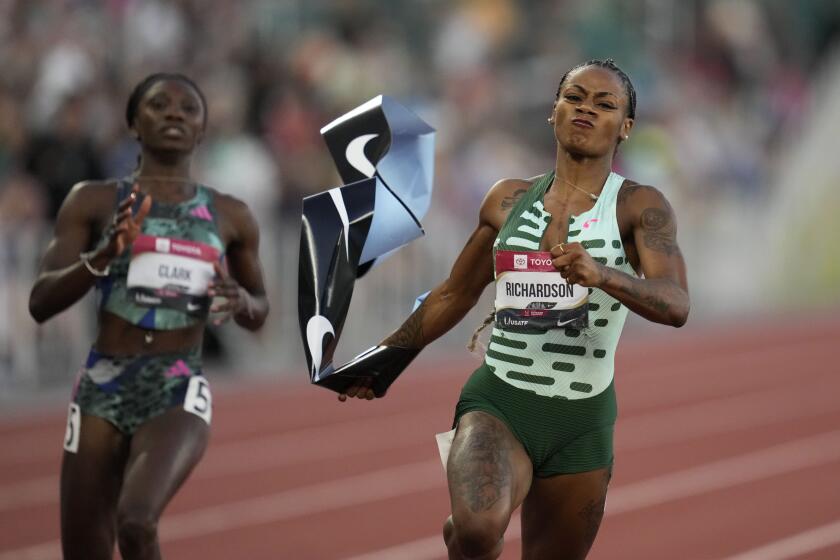What’s next for Sydney McLaughlin-Levrone and Athing Mu? Plenty, says Bobby Kersee

EUGENE, Ore. — Bobby Kersee is not easily impressed. Producing more than two dozen Olympic gold medalists over four decades in track and field has a way of raising a coach’s standards.
It was why it was notable — and should pique the interest of fans looking ahead to August’s world championships — that when Kersee left Hayward Field and the U.S. track and field championships late Saturday night here, he did so in a great mood.
The day had proved his plan, and his superstars’ trust in it, had worked. And it left open the question of whether a much-speculated future in which Athing Mu and Sydney McLaughlin-Levrone, the reigning Olympic and world champions in the 800 meters and 400 hurdles, compete for global medals in a second event has already arrived.
McLaughlin-Levrone’s time of 48.74 seconds to win the U.S. title in the open 400 meters Saturday was stunningly the 10th-fastest all-time, and just .04 behind a 17-year-old American record. Mu, who grew up a 1,500-meter runner but didn’t focus on the event once she found dominance in the 800, lowered her personal best by 13 seconds over the course of three rounds to finish second in a world championships-qualifying 4 minutes,3.44 seconds. Both train in Kersee’s select Los Angeles-based group.
“I was really, really happy with both of their performances,” Kersee said in an interview with The Times.
Initially, after both won gold medals at last year’s world championships, there had been speculation that both might attempt the challenge of competing in two individual events in time for the 2024 Paris Olympics. Saturday suggested that timeline could credibly be moved up to August’s world championships, given their performances. A decision on which events either will run at worlds has not been made, though Mu and Kersee each said, separately, that the 800 is at least part of her plan for worlds, which will be held in Hungary from Aug. 19-27.
Sydney McLaughlin-Levrone, the world’s top 400-meter hurdler, wins the 400-meter dash at U.S. nationals in 49.74 seconds, 10th-fastest time in history.
“We were talking about an 11-, 12-second PR [in the 1,500], but she didn’t flinch at it,” Kersee said. “In Sydney’s case it’s the same thing: She knew that 49 [seconds] was not going to be acceptable with me. She knew she was going to have to run 48 eventually to get my attention and she knew once she ran 48 that I’m looking for more. They both know what more is.
“I think now that I got two world-class athletes that [are] going to continue to believe in themselves and understand that there’s going to be a process between me and my coach.”
As reigning world champions, Mu owns an automatic bye into the world meet in the 800, and McLaughlin-Levrone has a bye into the 400 hurdles, the event in which she owns the world record.
Still, the assurance of owning at least one world-championships berth did not necessarily make their buy-in to Kersee’s plan automatic last winter as he floated the idea of dabbling in new events.
What he saw in Eugene this weekend indicated their willingness to “trust in the playbook,” and he lauded their commitment to reach beyond the comfort zone of their signature events.
“He has the calculations in his head,” McLaughlin-Levrone said. “I just show up to practice every day.”
Mu said the pace of the championship final was slower than her workouts.

“We don’t just go out on the track to go out on the track,” she said. “Every single workout we do is intentional.”
How much that belief could lower their times in the 1,500 and 400 was something Kersee wasn’t willing to project publicly, but Mu believes breaking 4 minutes is possible. “I feel like it’s not just breaking 4, I think we could go much further than that,” she said.
Mu would have run faster Saturday, Kersee agreed, had she opened her season running the 1,500 at May’s Los Angeles Grand Prix as initially planned.
“I think [Mu] would have run 3:57 or better here if we had that L.A. meet, but we didn’t, but I think what we got here was good enough to get to the final and then go ahead and say let’s go out there with the pack and do what we’re capable of doing,” Kersee said. “We figured that our goal was to be able to run 4:04 or better here. That’s what we wanted conditioning-wise to go into the world championship preparation, and wherever that lands us, it lands us.”
Mu began to mentally commit to racing the 1,500 at the U.S. championships in mid-March. She considers the event “fun” because it is, not as grueling as the 400 or 800 and affords two additional laps from her signature event to deploy strategy and overcome mistakes. A significant factor as to why she, too. left Hayward Field smiling was that perhaps not since her breakout season in 2021 had she run a championship-caliber race so free of pressure.
“It’s just really fun to be free,” Mu said.
Sha’Carri Richardson wins the women’s 100-meter national title with a time of 10.82 seconds to earn a berth on her first world championships team.
“It was just nice to be out there and be the quote-unquote ‘underdog’ and show everyone what Athing Mu could do without them really assuming anything,” she said.
That pressure-free feeling is now all but over. The way she ran with 1,500-meter specialists, and McLaughlin-Levrone’s near-record performance, shredded any lasting skepticism about the capability of either in their new events. Whether they race at August’s world championships in their new events, their signature competitions, or both, they will do so under weighty expectations, though none more weighty than their own coach’s.
“If I gave them a number that I believe that they can do, and I tell them why, they’re going to do it,” Kersee said. “I think that they’re not afraid. They showed me both now, again, that they’re not afraid to go after it.”
More to Read
Go beyond the scoreboard
Get the latest on L.A.'s teams in the daily Sports Report newsletter.
You may occasionally receive promotional content from the Los Angeles Times.









